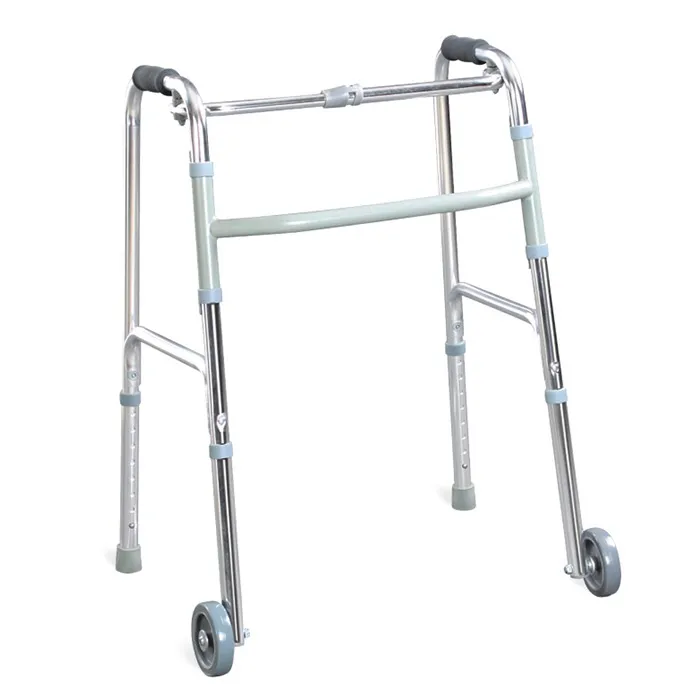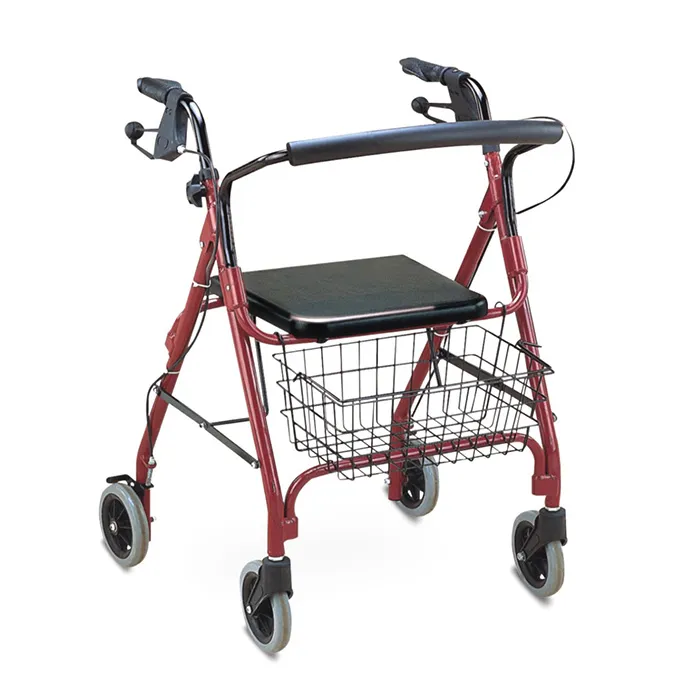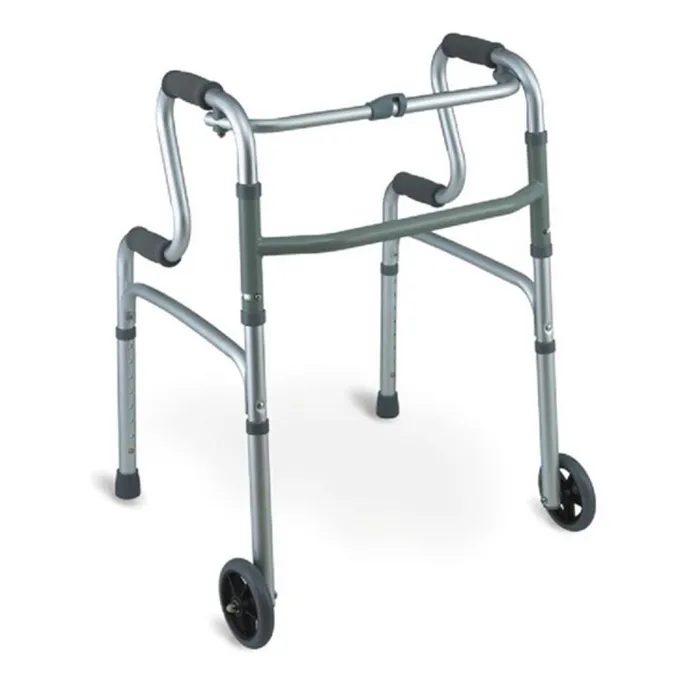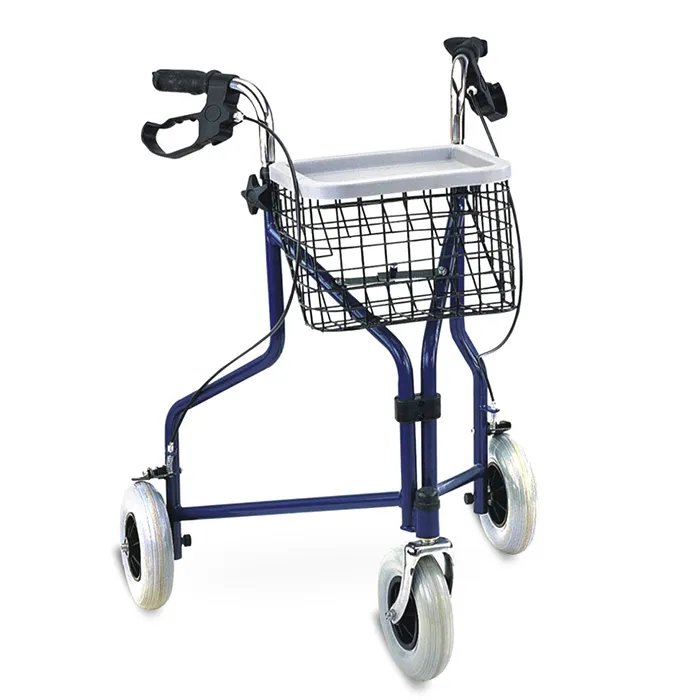Rollator walkers (also known as walkers, gait support vehicles, etc.) have become an important tool to help people with limited mobility improve their independence and enhance their quality of life. Whether in hospitals, rehabilitation centers, or in daily life at home, the popularity and practicality of rollator walkers have gradually increased, and they have become one of the indispensable equipment for many patients, the elderly, and people with mobility impairments.
Among all the materials used to make rolling walkers, aluminum alloy is widely used and has become one of the preferred materials for rolling walkers. So why do most rolling walkers prefer aluminum alloy? What are its unique advantages?
This article will analyze the application of aluminum alloy in rolling walkers in detail from multiple dimensions and explore why it has become the preferred material in this field.

What is the role of rolling walkers?
Rolling walkers are an auxiliary tool designed for people with limited mobility, designed to provide patients with more walking support and help them maintain a stable standing and gait. The design of rolling walkers needs to be adjusted according to the actual needs of the user to ensure that its function is maximized. Generally speaking, the functions of a rolling walker are mainly in the following aspects:
● Stability: A rolling walker provides stable support to help users maintain balance and reduce the risk of falling.
● Enhanced mobility: With the support of a rolling walker, users can regain the ability to walk independently to a certain extent.
● Reduce body burden: The design of a rolling walker helps to disperse body weight, reduce the burden on joints such as the knees and waist, and reduce the body pressure caused by long-term bed rest or wheelchair use.
What are the design requirements for a rolling walker?
When designing and manufacturing a rolling walker, multiple requirements need to be considered, especially the following points:
● Durability and strength: Since a rolling walker needs to bear the weight of the user, its material must have sufficient strength and durability.
● Lightweight: A rolling walker needs to be easy to carry and move, so lightweight materials are essential.
● Comfort: The design of a rolling walker should try to avoid discomfort to the user's body, while avoiding inconvenience caused by excessive friction or inappropriate size.
● Corrosion resistance: Rolling walkers often need to be used in different environments, such as indoors, outdoors or in humid environments. Therefore, its material needs to have corrosion resistance to ensure long-term stability.

Why do rollator walkers prefer aluminum alloy?
Aluminum alloy is an alloy composed of aluminum and other metal elements (such as copper, magnesium, silicon, manganese, etc.). It has the following significant characteristics, making it an ideal material for manufacturing rollator walkers:
1. Lightweight
One of the biggest advantages of aluminum alloy is its light weight. Compared with many metal materials, aluminum alloy has a lower density, so it can produce lighter products. For equipment such as rolling walkers that need to be used for a long time and are easy to move, lightness is particularly important. Aluminum alloy makes the overall weight of the rolling walker controlled, making it easier for users to push or carry, especially for the elderly with weak physical strength or patients in recovery, reducing additional physical exertion and improving the comfort of use.
2. Strength and durability
Although aluminum alloy is lighter, its strength is not inferior. After proper synthesis, the strength and hardness of aluminum alloy can reach a very high level. High-strength aluminum alloys can withstand heavy weights without deformation, ensuring the stability of the rollator walker during use. In addition, the toughness of aluminum alloys can also prevent damage caused by impact or accidental falls. For rollator walkers that are used for a long time, this balance of durability and strength is crucial.
3. Corrosion resistance
Another major advantage of aluminum alloys is their corrosion resistance. A dense oxide film is formed on the surface of aluminum alloys, which can effectively prevent corrosion from the external environment. This is especially important for rollator walkers, as they are usually used in various environments, including humid indoors and outdoors or environments that may encounter corrosive substances such as water and salt. The corrosion resistance of aluminum alloys ensures the appearance and structural stability of the rollator walker during long-term use, thereby extending its service life.
4. Plasticity and processability
Aluminum alloys have good plasticity and processability, and can be used to manufacture rolling walker parts of various shapes through different processing techniques (such as extrusion, casting, welding, etc.). Aluminum alloy can be easily processed into various shapes, which gives designers greater flexibility in designing rolling walkers and allows them to make precise design adjustments according to actual needs. In addition, the processing of aluminum alloy is relatively easy, with high production efficiency, which can reduce production costs.
5. Environmental protection
With the promotion of environmental protection concepts, aluminum alloy, as a recyclable material, has received more and more attention for its environmental protection. Aluminum alloy can be recycled many times without causing too much burden on the environment. For the environmentally oriented medical device industry, using aluminum alloy to make rolling walkers meets the needs of sustainable development.

What types of aluminum alloys are used in rollator walkers?
In modern medical auxiliary equipment, aluminum alloys have been widely used in many types of rollator walkers. Different types of rollator walkers have different requirements for materials, but aluminum alloys have become the preferred material for most rollator walkers due to their excellent performance. The following are some common types of aluminum alloy rollator walkers and their advantages:
1. Four-wheel rolling walker
The four-wheel rolling walker is the most common type of rolling walker, which is usually equipped with four wheels to help users maintain balance and reduce the risk of falling. The aluminum alloy frame of the four-wheeled rolling walker makes it lighter while maintaining sufficient strength and stability. This type of rolling walker is usually used by the elderly, postoperative rehabilitation patients and other groups to facilitate their indoor and outdoor activities.
● Aluminum alloy frame: The use of aluminum alloy makes the four-wheeled rolling walker not only light but also very durable, able to withstand the pressure and impact of daily use.
● Corrosion resistance: Whether in a humid environment or exposed to the sun, the corrosion resistance of aluminum alloy ensures that the appearance and structure of the four-wheeled rolling walker are not damaged after long-term use.
2. Folding rolling walker
The folding rolling walker is easy to carry and store. It is made of aluminum alloy material and can achieve a lightweight design while ensuring strength. The addition of the folding function not only increases convenience, but also makes this type of rollator walkerr an ideal choice for traveling.
● Lightweight design: Aluminum alloy makes the folding rollator walker lighter, especially suitable for the elderly or patients who need to use it for a long time.
● Easy to store and carry: The folding design allows the rollator walker to be easily folded when not in use, making it easy to store and carry.
3. Two-wheeled rollator walker
The two-wheeled rollator walker is suitable for patients with good physical strength. Its aluminum alloy frame design can provide sufficient stability and support to help users complete short-distance gait training and walking. Two-wheeled rollator walkers are usually simple and suitable for users who need a little assistance.
● Enhanced stability: The strength and toughness of aluminum alloy materials ensure the stability of the two-wheeled rolling walker, and it can provide reliable support even on uneven ground.

How to control the quality of aluminum alloy rollator walker manufacturing?
The production of aluminum alloy rollator walker involves not only the selection of aluminum alloy itself, but also precise manufacturing process and quality control. In order to ensure the performance and safety of the rollator walker, manufacturers usually strictly follow the relevant standards for production and quality inspection:
1. Material inspection: The quality of aluminum alloy directly affects the service life and performance of the rollator walker. Therefore, manufacturers need to strictly control the quality of aluminum alloy materials to ensure that the selected materials meet international standards and relevant requirements.
2. Precision manufacturing: Each component of the aluminum alloy rollator walker needs to be precisely processed to ensure the accuracy of its size and shape. The processing technology of aluminum alloy includes casting, extrusion, welding, etc., and each link needs to undergo strict technical review.
3. Safety testing: The stability and load-bearing capacity of the rollator walker are the key to ensuring the safety of users. Manufacturers usually conduct load-bearing tests, durability tests, impact resistance tests, etc. on products to ensure that each product meets the usage standards.
Do you provide after-sales support or spare parts?
Yes, we offer full after-sales support including spare parts supply, maintenance guides, and technical assistance. Our goal is to ensure long-term satisfaction for our clients. If you purchase from Yikang Medical, you gain a reliable partner and supplier committed to your success.
Are your products suitable for elderly care and rehabilitation centers?
Absolutely. Many of our items like nursing beds, commode chairs, walkers, and shower seats are designed with elderly care in mind. We supply these products to rehabilitation centers, nursing homes, and hospitals worldwide. Ask about our wholesale options for eldercare institutions.

